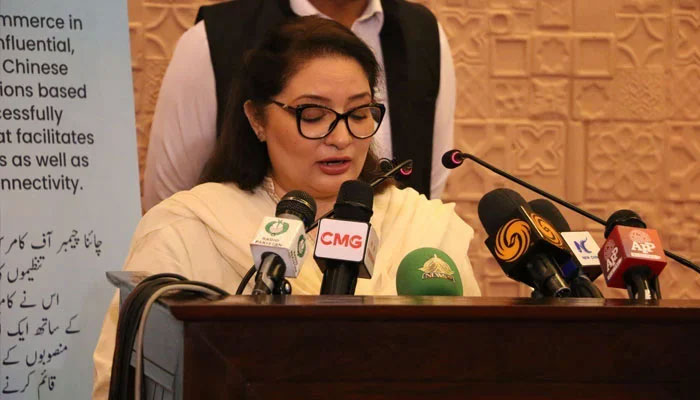Engaging youth emphasised to foster development of inclusive, green cities
Islamabad:Coordinator to the prime minister on climate change Romina Khurshid Alam on Monday warned that the challenges of increasing urbanisation and population growth presented significant barriers to achieving equitable growth and resilience in urban areas around the globe.
She also underscored the critical importance of garnering support from all sectors of society, especially focusing on engaging young people to foster the development of inclusive and environmentally friendly cities.
"By harnessing the energy, creativity, and perspectives of youth, cities can work towards more environmentally sustainable, equitable development, and resilient smart cities ensuring a pollution and carbon emissions free future," the coordinator told a World Habitat Day event at National University of Science and Technology here.
The day's theme was “Engaging youth to create a better urban future focusing on engaging youth in shaping sustainable cities and communities." The aide to the PM said cities must integrate climate adaptation strategies into urban planning to mitigate extreme weather risks.
She said cities accounted for 70% of global carbon emissions, with transport, buildings, energy, and waste management being major contributors. Ms Alam stressed the need for innovative technologies, recycling, green materials, and climate-resilient architecture.
"The building sector alone accounts for 39% of global carbon emissions. A fundamental transformation is necessary for eco-responsible development," she said. The PM's coordinator called for overcoming difficulties in achieving the Sustainable Development Goals, particularly concerning poverty, inequality, and the imminent dangers posed by climate change.
She noted that cities must integrate climate adaptation strategies into urban planning to mitigate risks associated with extreme weather events. Ms Alam emphasised that innovative technologies, the use of green materials, and construction techniques adapted to local conditions were some of the paths to be explored in the quest for more climate resilient and environmentally sustainable architecture.
She said that the research showed that by 2050, two-thirds of people in the world would live in urban areas, with nearly 90 per cent of the growth in urban population happening in Asia and Africa.
"The marking of this [World Habitat] Day focuses on how we can engage the new generation in climate resilient planning their urban present and future through participatory processes and local leadership opportunities," she said.
-
 Man Convicted After DNA Links Him To 20-year-old Rape Case
Man Convicted After DNA Links Him To 20-year-old Rape Case -
 Royal Expert Shares Update In Kate Middleton's Relationship With Princess Eugenie, Beatrice
Royal Expert Shares Update In Kate Middleton's Relationship With Princess Eugenie, Beatrice -
 Andrew Mountbatten-Windsor’s Leaves King Charles With No Choice: ‘Its’ Not Business As Usual’
Andrew Mountbatten-Windsor’s Leaves King Charles With No Choice: ‘Its’ Not Business As Usual’ -
 Dua Lipa Wishes Her 'always And Forever' Callum Turner Happy Birthday
Dua Lipa Wishes Her 'always And Forever' Callum Turner Happy Birthday -
 Police Dressed As Money Heist, Captain America Raid Mobile Theft At Carnival
Police Dressed As Money Heist, Captain America Raid Mobile Theft At Carnival -
 Winter Olympics 2026: Top Contenders Poised To Win Gold In Women’s Figure Skating
Winter Olympics 2026: Top Contenders Poised To Win Gold In Women’s Figure Skating -
 Inside The Moment King Charles Put Prince William In His Place For Speaking Against Andrew
Inside The Moment King Charles Put Prince William In His Place For Speaking Against Andrew -
 Will AI Take Your Job After Graduation? Here’s What Research Really Says
Will AI Take Your Job After Graduation? Here’s What Research Really Says -
 California Cop Accused Of Using Bogus 911 Calls To Reach Ex-partner
California Cop Accused Of Using Bogus 911 Calls To Reach Ex-partner -
 AI Film School Trains Hollywood's Next Generation Of Filmmakers
AI Film School Trains Hollywood's Next Generation Of Filmmakers -
 Royal Expert Claims Meghan Markle Is 'running Out Of Friends'
Royal Expert Claims Meghan Markle Is 'running Out Of Friends' -
 Bruno Mars' Valentine's Day Surprise Labelled 'classy Promo Move'
Bruno Mars' Valentine's Day Surprise Labelled 'classy Promo Move' -
 Ed Sheeran Shares His Trick Of Turning Bad Memories Into Happy Ones
Ed Sheeran Shares His Trick Of Turning Bad Memories Into Happy Ones -
 Teyana Taylor Reflects On Her Friendship With Julia Roberts
Teyana Taylor Reflects On Her Friendship With Julia Roberts -
 Bright Green Comet C/2024 E1 Nears Closest Approach Before Leaving Solar System
Bright Green Comet C/2024 E1 Nears Closest Approach Before Leaving Solar System -
 Meghan Markle Warns Prince Harry As Royal Family Lands In 'biggest Crises' Since Death Of Princess Diana
Meghan Markle Warns Prince Harry As Royal Family Lands In 'biggest Crises' Since Death Of Princess Diana




